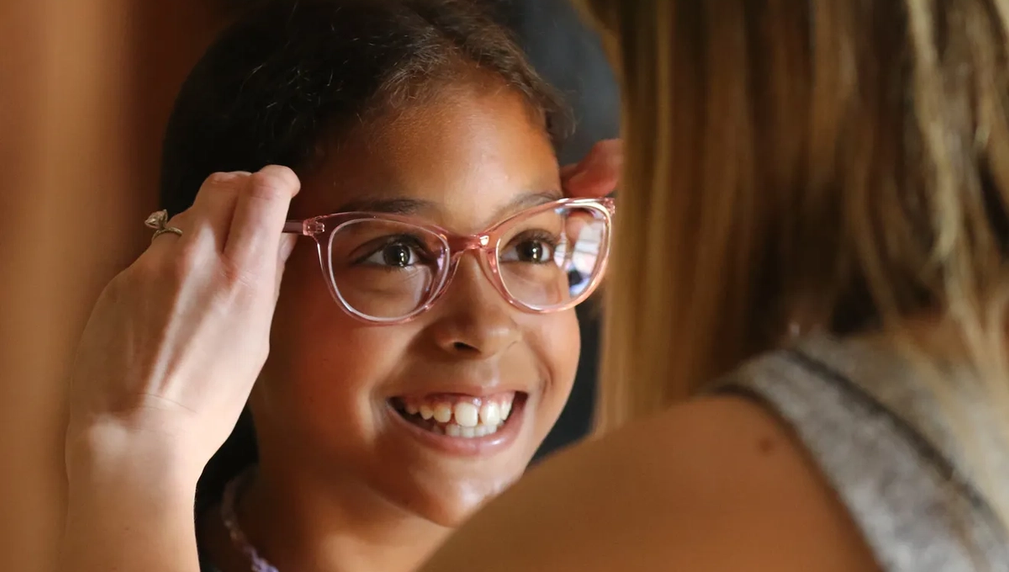Vision Screenings, Exams, and Glasses for Students in Los Angeles
One in four kids naturally needs glasses to see the board, read a book, or participate in class; in underserved communities, up to 95% of kids who need glasses do not have them. Millions of students nationwide and 30,000+ children in Los Angeles lack the vision care/glasses they need to succeed in school and life. Vision to Learn (VTL) provides mobile optometric screenings, exams, and glasses for students in need via a scalable clinic program that allows students to receive the vision care without taking time away from the school day.

What is the primary issue area that your application will impact?
Health care access
In what stage of innovation is this project, program, or initiative?
Expand existing project, program, or initiative (expanding and continuing ongoing, successful work)
What is your understanding of the issue that you are seeking to address?
Students with uncorrected vision problems are more likely to fail at least one grade, less likely to read at grade level by third grade and more likely to engage in antisocial behavior. In fact, up to 70% of juvenile offenders have uncorrected vision issues. Independent studies on the impact of our work have supported the expansion of the program: in 2021, researchers at Johns Hopkins University published a three-year study of VTL students in Baltimore. Findings showed that students provided glasses by VTL gained, on average, the equivalent of 2-4 additional months of learning. For students with Individual Education Plans, in the lowest quartile of test-takers, or those enrolled in special education courses, the gains were equivalent to an additional 4-6 months of learning. The benefits provided by glasses from VTL were more significant than 1:1 technology, extended day, and even 1:1 tutoring for those struggling the most academically.
Describe the project, program, or initiative this grant will support to address the issue.
To provide students with the highest level of service, VTL developed a streamlined process for vision screenings and exams that lets us see students in a welcoming setting. The VTL process is as follows:
1) Collaborate with school officials to begin the planning process; meet with Principals, school nurses, or other staff, and create a screening/ exam schedule
2) VTL performs vision screenings using a Welch Allyn Spot Vision Screener, to determine which students have vision difficulties
3) After screenings are completed, VTL staff coordinate with school contacts to create clinic exam schedule; the mobile clinic arrives at the school where trained opticians and optometrists conduct eye exams
4) If a student needs glasses, they choose a frame from a wide selection available aboard the clinic. 5) Once glasses are ready, VTL staff coordinate with school staff to arrange a time to deliver the glasses (approximately 2-3 weeks later). If a child loses or breaks their glasses within one year, VTL replaces them free of charge.
Our goal is to return every two years to recheck vision to provide new prescriptions/glasses.
By using an enhanced exam protocol, we can see students efficiently while also proving the highest level of medical care simultaneously. This program not only provides the students with vision care but also allows them to not miss more than 20 minutes of school and gives them a higher chance of success both academically and in their extracurricular activities.
Describe how Los Angeles County will be different if your work is successful.
VTL uses an evidence-based model of care that addresses a critical health need to solve a common educational barrier. Researchers at Johns Hopkins University's Wilmer Eye Center analyzed the benefits to children after receiving eye exams and glasses. This controlled study published in the JAMA Ophthalmology Journal, represents the most comprehensive study of school-based glasses provision ever conducted (2021). The study's findings quantified the impact of our program: students who received glasses made gains, on average, equivalent to an additional 2-4 months of learning time. Those in the lowest quartile of test-takers, those with IEPs, and enrolled in Special Education classes made gains equivalent to 4-6 months of learning. Evidence shows a pair of glasses improves academic performance and engagement in the classroom which then, in turn, impacts long-term student outcomes (e.g. graduation, college) and overall educational attainment.
What evidence do you have that this project, program, or initiative is or will be successful, and how will you define and measure success?
VTL shares knowledge gained through analyzing the operations of our services in both formal and informal ways. Informally, regional program managers maintain consistent communication with school districts, individual school educators and staff, and staff at community organizations where we also conduct site visits. VTL regularly shares best-practices with peer nonprofit organizations. Knowledge learned from our programs is shared with experts including school district leadership, local/state/federal policymakers, and other nonprofit organizations with aligned missions. These relationships also allow VTL to remain current on developments in the field of pediatric optometry to enhance our services as needed. VTL participates in projects to formally share knowledge: examples of this are the UCLA and JHU studies cited throughout this application. Results from data gathered by researchers, published in respected/ peer-reviewed journals, which can have a significant impact on global scale.
Approximately how many people will be impacted by this project, program, or initiative?
Direct Impact: 500.0
Indirect Impact: 1,500.0